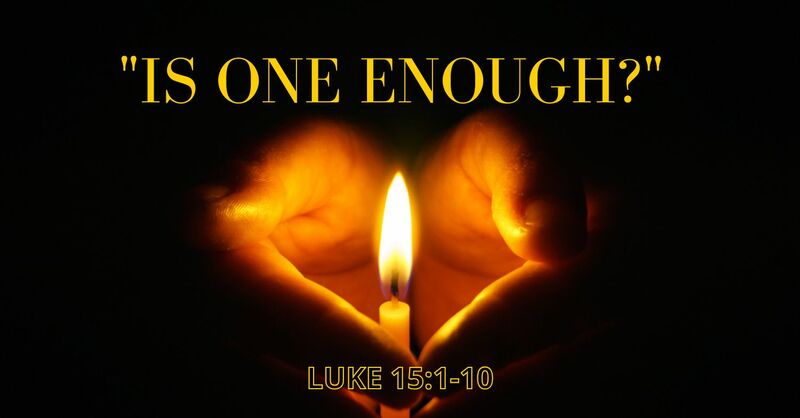
Sermon Summary
This week’s events have stirred deep emotions and controversy, and it’s tempting to avoid difficult conversations in church. Yet, if we cannot face these realities together in faith, where else will we find the courage and wisdom to respond as Christ calls us? The tragic loss of life—no matter who it is—should never be celebrated, but neither should we ignore the harm caused by divisive rhetoric and policies. Our society is saturated with violence, especially against children, and with each new tragedy, we risk growing numb, accepting injustice as normal. But God’s heart is never numb. God’s love is relentless, seeking out the lost, the marginalized, and the hurting, no matter how small or overlooked they may seem.
Jesus’ parables of the lost sheep and the lost coin remind us that for God, one is always enough. God moves heaven and earth for the sake of even a single person who is hurting or excluded. This is not foolishness, but the very heart of divine love. We are called to embody that same heart, to refuse to accept the expendability of any life, and to challenge the narratives and systems that perpetuate harm—whether through violence, racism, or indifference.
Our children see the world’s injustices with a clarity that should humble us. They absorb the anxieties and divisions of our society, and they know when something is not right. If even a child can recognize injustice, how much more should we, as people of faith, be moved to act? The trauma inflicted on black and brown children, on immigrant families, and on all who are marginalized is not something God would ever bless. Our response must be to speak out, to support those who are vulnerable, and to use our voices and resources to create a more just and compassionate world.
This week marks the beginning of Latino and Hispanic Heritage Month—a time to celebrate culture and contributions, but also to tell the truth about ongoing injustices. For those who are not Latino, this is a call to solidarity: to support, to speak up, and to stand with those who are at risk. God does not rest until the lost are found and the marginalized are brought home. If God is willing to move for the sake of one, so must we. One life, one child, one family is enough to move the heart of God—and it must be enough to move ours as well.
Key Takeaways
- 1. The pulpit is not a place to avoid hard truths, but a space to confront them with honesty and faith. When society becomes numb to tragedy and division, the people of God are called to resist apathy and bear witness to the pain and injustice that surround us. Our faith demands that we not turn away, but instead engage with the world’s brokenness, trusting that God’s love is sufficient for every wound. [01:42]
- 2. God’s love is radically particular: for God, one lost sheep, one lost coin, one hurting person is worth all the effort in the world. This challenges our tendency to see individuals as expendable or to accept injustice as inevitable. We are called to embody this relentless love, seeking out and restoring those who are overlooked or cast aside, no matter how small their number may seem. [10:01]
- 3. The language we use and the stories we tell shape the world our children inherit. Children absorb the anxieties, prejudices, and hopes of their communities, often seeing injustice with a clarity that adults have lost. We must be intentional in teaching them to recognize and resist injustice, and to value every person as made in the image of God. [13:27]
- 4. Solidarity requires more than sympathy; it demands action and risk. For those with privilege, standing with the vulnerable may mean using your voice, your presence, or your resources to protect and uplift others. True community is built when we are willing to move out of our comfort zones and bear one another’s burdens, even when it costs us something. [19:27]
- 5. God’s heart is restless until justice is done and the lost are restored. If God is willing to leave comfort behind for the sake of one, we too must be willing to move, to speak, and to act. The measure of our faith is not in how we treat the many, but in how we respond to the one who is hurting, excluded, or afraid. ** [23:29]
YouTube Chapters
- [00:00] - Welcome
- [01:42] - Addressing Tragedy and Division
- [03:09] - Overlooked Violence in Our Communities
- [04:20] - Double Standards in Mourning and Justice
- [05:53] - Challenging Harmful Narratives
- [07:13] - The Call to Speak Against Misinformation
- [07:58] - The Parable of the Lost and God’s Heart
- [10:01] - Numbness to Injustice and the Value of One
- [10:42] - Children’s Fears and the State of Our Nation
- [13:27] - Children’s Moral Clarity and Personal Stories
- [15:31] - Subtle Racism and the Power of Words
- [16:38] - Living for the Next Generation
- [17:37] - Latino Heritage and Telling the Truth
- [18:34] - Fear and Exploitation in Immigrant Communities
- [19:27] - The Cost and Necessity of Solidarity
- [20:27] - Teaching Our Children to Stand for Justice
- [21:20] - Embodying God’s Relentless Love
- [23:29] - Moving Out of Comfort for the Sake of One
- [24:06] - Is One Enough?
- [24:42] - Prayer for the Lost and the Found


